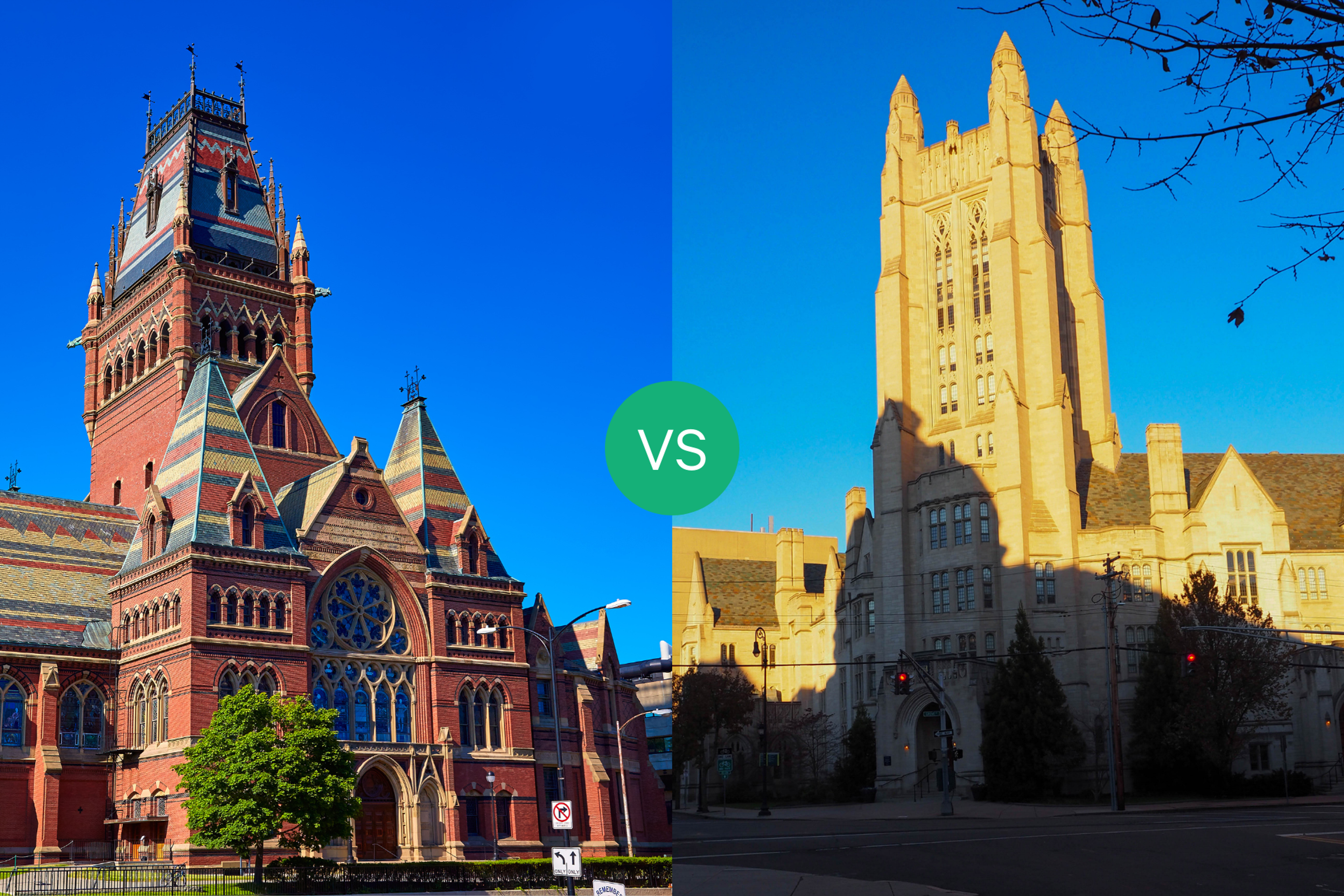Duke University School of Law Vs. Georgetown University Law Center: An In-Depth Comparison
Are you considering pursuing a law degree? Read this comprehensive article comparing Duke University School of Law and Georgetown University Law Center to help you make an informed decision.
Posted April 10, 2025

Table of Contents
Are you considering attending law school but not sure where to go? In this article, we will provide an in-depth comparison of Duke University School of Law and Georgetown University Law Center to help you make an informed decision. From the admissions process to career opportunities after graduation, we'll explore everything you need to know about these two prestigious law schools.
Introduction: Why Compare Duke and Georgetown Law Schools?
Both Duke University School of Law and Georgetown University Law Center are highly regarded institutions that offer excellent legal education. However, they have different strengths and weaknesses, and each school might be a better fit for certain individuals depending on their personal and career goals. By comparing Duke and Georgetown Law Schools side by side, we hope to clarify some of the key differences and help you decide which one is the best match for you.
One of the key differences between Duke and Georgetown Law Schools is their location. Duke is located in Durham, North Carolina, which is a smaller city with a more laid-back atmosphere. Georgetown, on the other hand, is located in the heart of Washington D.C., which offers students access to a wide range of legal and political opportunities. This can be a major factor for students who are interested in pursuing careers in government or public interest law.
Another important factor to consider when comparing Duke and Georgetown Law Schools is their curriculum. Duke is known for its strong focus on interdisciplinary studies, which allows students to explore legal issues from a variety of perspectives. Georgetown, on the other hand, is known for its strong emphasis on international law and its extensive network of alumni who work in this field. This can be a major factor for students who are interested in pursuing careers in international law or diplomacy.
History of Duke University School of Law and Georgetown University Law Center
Duke University School of Law was founded in 1930 and is located in Durham, North Carolina. The law school is part of Duke University, a private research university that was established in 1838. Georgetown University Law Center, on the other hand, was founded in 1870 and is located in Washington, DC. Georgetown University is a private Jesuit Catholic research university that was founded in 1789.
Both Duke and Georgetown Law Schools have a long and rich history, and they have produced many distinguished legal professionals throughout the years. Duke Law, for example, has produced several US senators and governors, as well as numerous judges, attorneys, and business leaders. Meanwhile, Georgetown Law has alumni who hold high-ranking government positions, such as US Supreme Court justices, US senators, and US ambassadors.
In addition to their impressive alumni networks, both Duke and Georgetown Law Schools are highly ranked institutions in the United States. According to US News & World Report's 2021 rankings, Duke Law is ranked #10 and Georgetown Law is ranked #14 among all law schools in the country. These rankings are based on factors such as academic reputation, selectivity, and job placement rates.
Location and Campus Overview: Durham, NC vs. Washington, DC
The location of a law school can play a significant role in your student experience, and it's important to consider the advantages and disadvantages of each school's location before making a final decision. Duke University School of Law is situated in Durham, North Carolina, a mid-sized city that offers a mix of urban and suburban environments. Durham is best known for its thriving Research Triangle region, which is home to several prominent universities, tech companies, and research institutes.
Georgetown University Law Center, on the other hand, is located in Washington, DC, the capital of the United States. Washington, DC, is a bustling city that offers a unique blend of political, cultural, and social opportunities. As the nation's capital, Washington, DC is the hub of American politics and a major center for international affairs. It's also home to dozens of museums and cultural institutions, as well as many of the nation's most iconic landmarks and monuments.
One advantage of attending Duke University School of Law is the lower cost of living in Durham compared to Washington, DC. This can make a significant difference in your overall expenses as a law student. Additionally, Durham's location in the southeastern United States provides easy access to nearby beaches and mountains, offering opportunities for outdoor recreation and relaxation.
On the other hand, Georgetown University Law Center's location in Washington, DC, provides unique opportunities for students interested in government and public policy. The school is located just blocks away from the US Capitol and the Supreme Court, providing easy access to internships and networking opportunities. Additionally, the city's diverse population and international presence offer a rich cultural experience for students interested in global issues.
Admissions Process: How to Get into Duke or Georgetown Law School
Getting accepted into Duke or Georgetown Law School is highly competitive, and the admissions process can be daunting. Both schools require applicants to submit their LSAT scores, college transcripts, letters of recommendation, and personal statements as part of their application materials.
Duke Law and Georgetown Law also have different admissions standards and requirements. For example, Duke Law places a strong emphasis on academic excellence and typically admits students with a median LSAT score of 169. Georgetown Law, on the other hand, values diversity and inclusivity and looks for applicants who demonstrate a commitment to public service.
In addition to the required application materials, both Duke Law and Georgetown Law also offer optional interviews for applicants. These interviews can provide an opportunity for applicants to showcase their personality, communication skills, and interest in the school.
It is also important for applicants to research and understand the specific programs and opportunities offered by each law school. Duke Law, for example, has a strong focus on intellectual property law and offers a specialized program in this area. Georgetown Law, on the other hand, has a renowned program in international law and offers opportunities for students to study abroad and gain practical experience in this field.
Curriculum Comparison: Courses, Programs, and Specializations Offered
Both Duke and Georgetown Law Schools offer rigorous and comprehensive legal education, with a variety of courses, programs, and specializations that cover a wide range of legal topics and practice areas. Duke Law, for example, offers several concentration areas, including Business Law, Constitutional Law, and Intellectual Property Law. Georgetown Law, on the other hand, has established itself as a leader in International Law, National Security Law, and Public Interest Law.
It's worth noting that Duke and Georgetown Law Schools also have different approaches to legal education. Duke Law emphasizes experiential learning and provides several opportunities for students to gain practical experience through clinics, practicums, and externships. Georgetown Law, on the other hand, focuses on interdisciplinary learning and encourages students to explore different legal topics through its Law Center Lecture Series and various research programs.
Faculty Comparison: Leaders in the Legal Industry Teach at Both Schools
Both Duke and Georgetown Law Schools have a distinguished faculty that includes some of the most accomplished legal scholars and practitioners in the country. Duke Law, for example, has over 90 full-time faculty members, many of whom are experts in their respective fields and have authored influential legal publications. Georgetown Law, on the other hand, has a large faculty of over 125 full-time professors, many of whom have extensive experience in private practice, government service, and academia.
Student Life and Extracurricular Activities: What Sets Duke and Georgetown Apart?
Law school can be challenging, and it's important to find a supportive and welcoming community that can help you navigate the ups and downs of legal education. Both Duke and Georgetown Law Schools offer a diverse and vibrant student life, with ample opportunities for socializing, networking, and getting involved in extracurricular activities.
Duke Law, for example, has over 40 student organizations, including the Black Law Students Association, the Duke Law ACLU, and the Women Law Students Association. Georgetown Law, on the other hand, has over 85 student organizations, including the Georgetown Law Journal, the International Law Society, and the Women's Legal Alliance.
Career Opportunities After Graduation: Job Placement Rates, Employers, and Salaries
One of the most important factors to consider when choosing a law school is the likelihood of finding a good job after graduation. Both Duke and Georgetown Law Schools have a strong track record of job placement and have established relationships with various law firms, corporations, and government agencies.
According to data from 2019, Duke Law had a 92.7% employment rate within 10 months of graduation, with a median starting salary of $180,000 for private sector jobs. Georgetown Law, on the other hand, had an 89.1% employment rate within 10 months of graduation, with a median starting salary of $180,000 for private sector jobs.
Alumni Networks: Connections to Legal Professionals Across the Country
Networking is a crucial part of the legal profession, and attending a prestigious law school can provide you with access to a vast network of successful and influential legal professionals. Both Duke and Georgetown Law Schools have active alumni associations that offer various networking events, mentorship programs, and career development resources.
Georgetown Law, in particular, has a strong reputation for its alumni network, which includes over 20,000 members in the United States and abroad. Many Georgetown Law alumni hold prominent leadership positions in the legal industry and are well-connected with other esteemed professionals.
Cost of Attendance: Tuition, Financial Aid, and Scholarships Available at Duke and Georgetown
Finally, it's important to consider the cost of attendance when deciding between Duke and Georgetown Law Schools. Both schools are private institutions, and the tuition and fees can be steep. However, both Duke and Georgetown Law Schools offer various financial aid and scholarship options to help students offset the cost of attendance.
As of 2020, the estimated cost of attendance for Duke Law is approximately $80,763 per year, including tuition, fees, and living expenses. Georgetown Law's estimated cost of attendance is slightly higher, at around $84,406 per year. However, both schools offer need-based and merit-based scholarships, as well as federal and private loan programs to assist students with financing their legal education.
Conclusion: Which Law School is Right for You? A Recap of the Key Differences Between Duke and Georgetown
In conclusion, choosing between Duke University School of Law and Georgetown University Law Center can be a challenging decision. Both schools offer excellent legal education and have a strong reputation for producing top-notch legal professionals. However, they have different strengths and weaknesses, and it's essential to consider various factors, such as location, admissions standards, curriculum, faculty, student life, job placement rates, alumni network, and cost of attendance, before making a final decision.
If you are looking for a law school that emphasizes experiential learning, has a strong focus on business law and intellectual property law, and is located in a mid-sized city with a vibrant research community, Duke University School of Law might be the perfect fit for you. On the other hand, if you are interested in public interest law, international law, and national security law, and are drawn to the dynamic and diverse environment of Washington, DC, Georgetown University Law Center could be the right choice.











